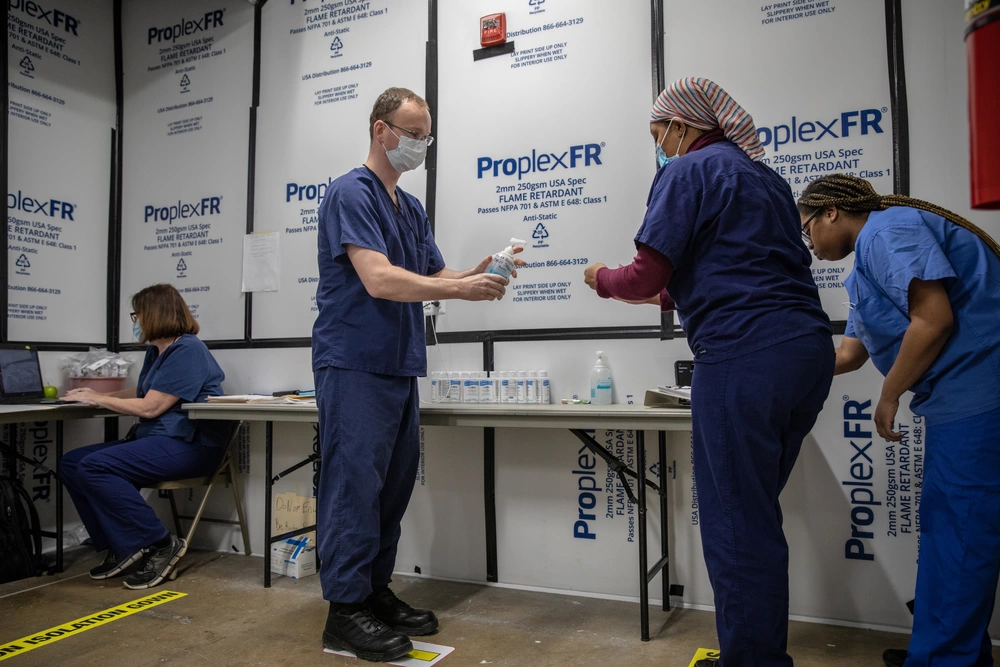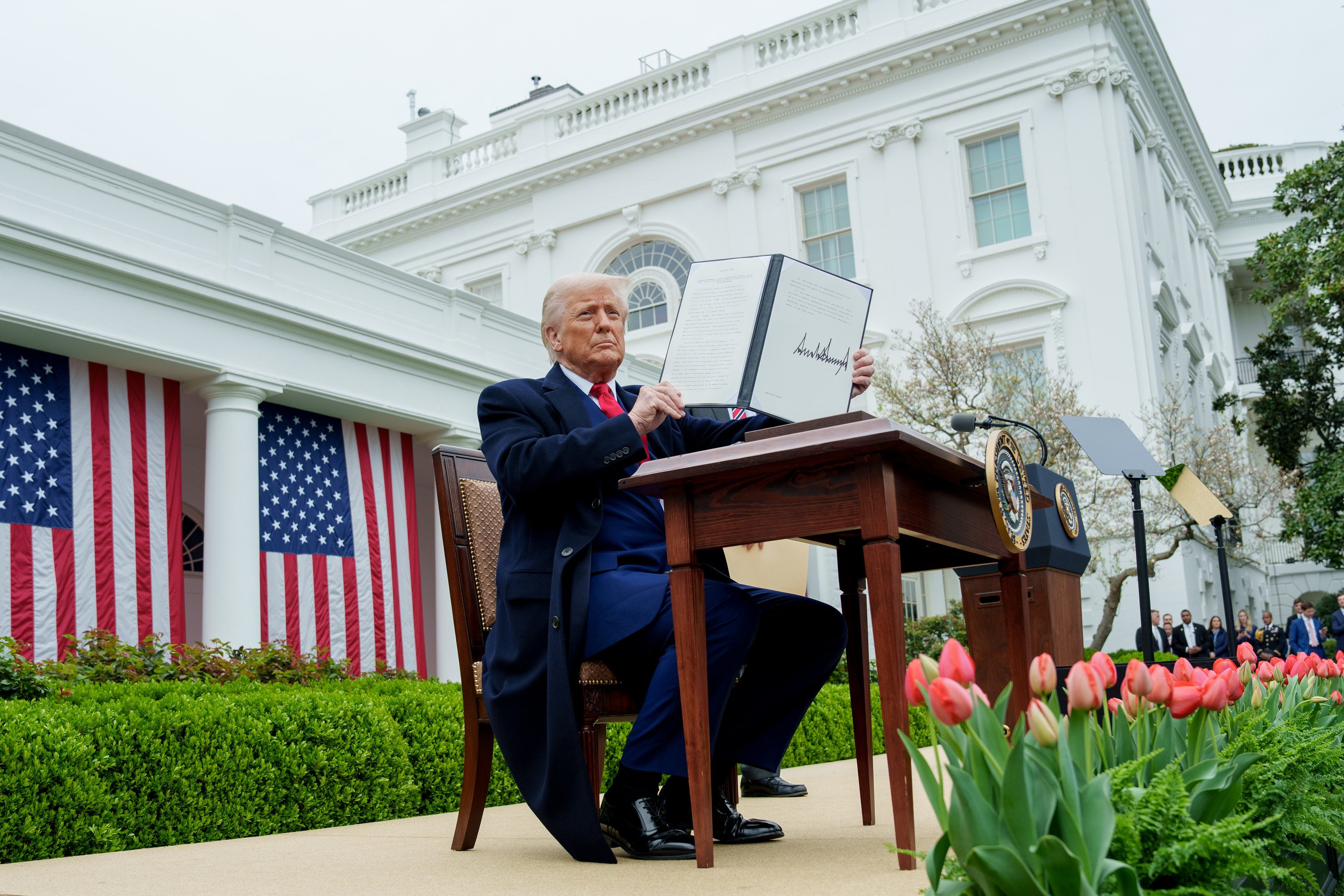Eighth Circuit Revives Missouri’s COVID-19 Suit Against China
Missouri’s suit is the first of dozens to hurdle the Foreign Sovereign Immunities Act and could create major friction with China.

Published by The Lawfare Institute
in Cooperation With

When the coronavirus ripped through the United States in 2020, some Americans sought recourse for what they saw as China’s role in precipitating the pandemic. In a longshot attempt to recover for their coronavirus-related injuries and hold China accountable, plaintiffs filed over a dozen highly publicized lawsuits against the People’s Republic of China. The State of Missouri brought the most significant of these suits, which accused the Chinese government and related defendants of causing the pandemic, allowing it to spread, and hoarding personal protective equipment (PPE). But in 2022, a district court dismissed Missouri’s claims, holding that it had no authority to hear the case under the Foreign Sovereign Immunities Act (FSIA).
Earlier this year, the Eighth Circuit confirmed that the FSIA stood in the way of most of Missouri’s claims, but it permitted one claim—about China’s alleged hoarding of PPE—to move forward. That decision is already affecting other coronavirus suits: On April 8, the State of Mississippi moved for discovery in its own case against China on the grounds that “[t]he Eight[h] Circuit’s ruling ... illustrates the viability of Mississippi’s claims.” Examining the Eighth Circuit decision is thus essential to understanding other plaintiffs’ prospects of success against China as well as the serious foreign policy consequences that may follow further litigation.
The District Court Case
The FSIA provides that foreign states—including their political subdivisions, agencies, and instrumentalities—are presumptively immune from suit in the United States. But the FSIA also enumerates certain exceptions to that immunity that plaintiffs can use to bring suit against foreign sovereigns.
Missouri filed one such suit against China in April 2020, claiming that a variety of Chinese defendants were liable for (1) public nuisance, (2) abnormally dangerous activities, (3) breach of their duty “to the world” (including Missouri and its residents) for allowing transmission of the coronavirus, and (4) breach of duty for hoarding PPE. China and the other defendants refused to participate in the suit, but as one of us (Mirski) had previously anticipated, several nominally independent amici filed arguments in support of their immunity.
In July 2022, the District Court for the Eastern District of Missouri agreed with the amici that all the defendants were presumptively entitled to immunity, and it held that the State of Missouri had failed to establish that the suit fell within any of the FSIA’s enumerated exceptions to immunity. The court accordingly dismissed the suit.
Missouri appealed, and once again, the Chinese defendants refused to appear, leaving the defense of their sovereignty to nominally independent amici.
The Appeal
On appeal, the Eighth Circuit affirmed in part and reversed in part the district court’s dismissal. Joined by Judge Jonathan A. Kobes, Judge David R. Stras began his analysis for the panel majority by explaining why each of the Chinese defendants was presumptively entitled to immunity under the FSIA. He concluded that the People’s Republic of China and other government defendants (including the Chinese National Health Commission, Ministry of Emergency, and Ministry of Civil Affairs) were safely entitled to immunity as either a foreign state or parts of a foreign state. A similarly simple call was that the province of Hubei and city of Wuhan were “political subdivisions” of the People’s Republic and were accordingly entitled to immunity as well. The court also concluded that FSIA immunity extended to the Wuhan Institute of Virology and Chinese Academy of Sciences, which were agencies and instrumentalities of the Chinese state because they were “closely enough connected” to and under the “control” of the Chinese government to qualify as its organs.
The Eighth Circuit also agreed with the district court that the Chinese Communist Party (CCP) was immune under the FSIA. Even though the CCP “may look like a nongovernmental body at first glance,” Missouri’s own complaint had alleged that the CCP “exercise[s] direction and control over the actions of all other Defendants,” including China’s government. The Eighth Circuit thus concluded that Missouri had alleged the CCP was functionally the “body politic that governs [China].”
After concluding the defendants were presumptively immune under the FSIA, the Eighth Circuit spent the bulk of its opinion analyzing whether any exception to immunity applied to the defendants’ alleged conduct. The FSIA sets out a number of exceptions to foreign sovereign immunity, but the court found only two that potentially apply here: the noncommercial tort exception and the commercial activity exception. After analyzing both, the Eighth Circuit affirmed the district court’s dismissal of all of the State of Missouri’s claims except its PPE-hoarding claim.
The Eighth Circuit first established that the FSIA’s noncommercial tort exception did not cover the acts alleged in Missouri’s complaint. The FSIA denies immunity under that exception “for personal injury or death, or damage to or loss of property, occurring in the United States and caused by the tortious act or omission of [any] foreign state.” But where the alleged acts represent the “discretionary functions” of a foreign state, the exception does not apply, and the defendant is entitled to immunity. That exception to the exception places the policy decisions of foreign states “outside the purview of American courts.”
The court held that, even assuming China’s actions were tortious, they fell within this exception to the exception. All of the defendants’ acts alleged in the complaint—such as permitting large gatherings in Wuhan and bringing suit against doctors who attempted to disseminate information about the coronavirus—were discretionary policy decisions. Because the complaint did not suggest that any of these decisions were “mandatory or forbidden in China”—that is, directly required or prohibited by law—they were therefore a “judgment or choice” of Chinese policymakers. As a result, the FSIA noncommercial tort exception did not apply.
The court then analyzed whether the FSIA’s commercial activity exception applied to the Chinese defendants’ conduct. Where, as here, the alleged conduct took place outside the territory of the United States, the FSIA’s commercial activity exception abrogates immunity if the conduct occurred “in connection with a commercial activity of the foreign state elsewhere” and “cause[d] a direct effect in the United States.”
The panel majority first concluded that this FSIA exception did not apply to Missouri’s first three claims of public nuisance, abnormally dangerous activities, and breach of duty for allowing transmission of the coronavirus. With respect to these claims, Missouri’s complaint attributed the harm it suffered to the defendants’ alleged virus research, mismanagement of the Chinese health care system, and use of media and social media platforms to censor information about the spread of the coronavirus. But the court found that China’s actions had produced only “remote and attenuated” effects in the United States rather than the “direct” effects the FSIA requires. The court could not discern any “direct causal chain” between China’s alleged misconduct and Missouri’s purported injuries because too many “intervening” steps were needed.
For example, the court reasoned, for Missouri to have suffered the economic injuries it alleged, at least one infected person had to travel outside China; the virus then had to spread to the United States; and infections in Missouri had to reach a high enough level for the government to issue a stay-at-home order, which Missourians had to then follow. Only after that series of events did Missouri schools and businesses close and its economy slow dramatically. So, the court held, it was impossible to directly trace the economic and other harms suffered by Missouri to virus research in Wuhan, the functioning of China’s health care system, or media censorship. Even assuming the Chinese defendants’ conduct constituted commercial activity, the court concluded, it did not have a “direct effect” in the United States.
By contrast, the panel majority found the PPE-hoarding claim fell within the commercial activity exception. First, the court concluded that when the defendants took over mask-producing factories, purchased a substantial portion of the global supply of PPE, and sold the PPE for a profit, they acted less like sovereigns and more like private market players engaging in textbook “anticompetitive behavior.” These actions therefore constituted commercial activity.
Next, the court held that this anticompetitive behavior had a “direct effect in the United States.” Because the Chinese government allegedly bought up and stockpiled masks, the rest of the world, including Missouri, suffered an “immediate shortage” of PPE. Missourian health care providers, for example, were forced to pay higher prices for lower quality masks, to the extent they could find them at all. Scarce and low-quality masks in turn hindered the ability of health care providers to safely treat coronavirus-afflicted patients, precipitating lockdowns and leading to devastating economic and other injuries. Accordingly, Missouri’s injuries were, in the panel’s eyes, a direct effect of the Chinese defendants’ anticompetitive behavior. The panel therefore held that Missouri had “alleged enough to allow the claim to proceed beyond a jurisdictional dismissal on the pleadings.” It reversed the dismissal of the PPE-hoarding claim under the FSIA and remanded the case back to the district court for further proceedings.
Concurring in part and dissenting in part from the majority opinion, Chief Judge Lavenski R. Smith agreed with the district court that the PPE-hoarding claim should have been dismissed. He argued that the effects of PPE hoarding would have manifested only over time and were therefore not “direct” enough to qualify under the commercial activity exception.
Implications of the Eighth Circuit’s Decision
Commentators generally expected Missouri’s allegations to be dismissed, so most of the Eighth Circuit’s opinion was not especially surprising. But the panel majority’s holding on the PPE-hoarding claim was more of a surprise, and plaintiffs in the other pending coronavirus cases are likely to leverage it in their own cases. The decision is particularly welcome for the State of Mississippi, which also brought a PPE-hoarding claim against Chinese defendants and is currently awaiting a Mississippi district court’s ruling on its case management plan.
That said, it may be difficult for other litigants to replicate Missouri’s success. First, other courts may align themselves with Chief Judge Smith’s dissent and find that PPE hoarding does not have a sufficiently direct effect in the United States to come within the FSIA’s commercial activity exception. Those courts might reason that under the Eighth Circuit’s decision, a great deal of foreign commercial activity could qualify for the FSIA’s exception to immunity—undermining the purpose of the law. Furthermore, individual private litigants may have considerably more difficulty, compared to a state suing on behalf of all of its residents, in connecting allegations of PPE hoarding to their individual injuries, especially with the sort of “direct causal chain” that the commercial activity exception requires.
Even the State of Missouri still faces significant challenges after the Eighth Circuit’s decision. Through this stage in the litigation, the courts have assumed that Missouri’s factual allegations are true. But on remand, Missouri must prove that China manipulated the worldwide PPE market in order to conclusively overcome the FSIA and obtain a judgment against the Chinese defendants.
If Missouri is successful, it could win a default judgment that would be hard for China to ignore: Its complaint demands “billions—and possibly tens of billions—of dollars [for] economic damages, as well as substantial non-economic damages.” If Missouri obtains such a judgment, it will presumably try to enforce it against China’s assets in the United States. Doing so will not be easy, however, for these assets are immune from attachment under a separate section of the FSIA that is even more demanding in many ways than the immunity granted to foreign sovereigns themselves.
The resulting litigation could nevertheless have serious foreign policy implications and could emerge as another source of friction between China and the United States. One of us (Bellinger) has previously noted that congressional proposals to strip China of its immunity could lead China to respond with reciprocal measures against the United States. Some have argued in response that this concern is overblown because the United States does not engage in commercial activity to the same extent the CCP does, so Chinese courts could not weaponize the Eighth Circuit’s rule against the United States. But that overstates the difference in commercial activity between the two countries, and regardless, China has other ways of making its displeasure known.
On Jan. 11, the day after the Eighth Circuit’s decision came down, the Chinese Embassy transmitted a fiery diplomatic note to the State Department regarding the coronavirus cases brought against it by Mississippi and another plaintiff. In that note, the embassy made clear that China “does not accept and will not participate in such lawsuits.” China called on the U.S. government to “immediately take every necessary measure to restrain and stop the frivolous lawsuits,” asserting that the United States must “prompt ... Mississippi to withdraw the lawsuit” and “urge the related courts to terminate the proceedings.” China’s Ministry of Foreign Affairs issued similar diplomatic notes to the U.S. Embassy in Beijing nearly a year before, in February 2023, regarding the coronavirus cases; evidently China remains outraged by—and sensitive to—this litigation.
Continued tension over these suits could lead the Chinese government to retaliate against the United States, potentially even by stripping the United States’s immunity in Chinese courts. Indeed, in its note, the embassy threatened that “[i]f the U.S. side allows the frivolous lawsuits to proceed, the Chinese side reserves the right to take reciprocal countermeasures.”







